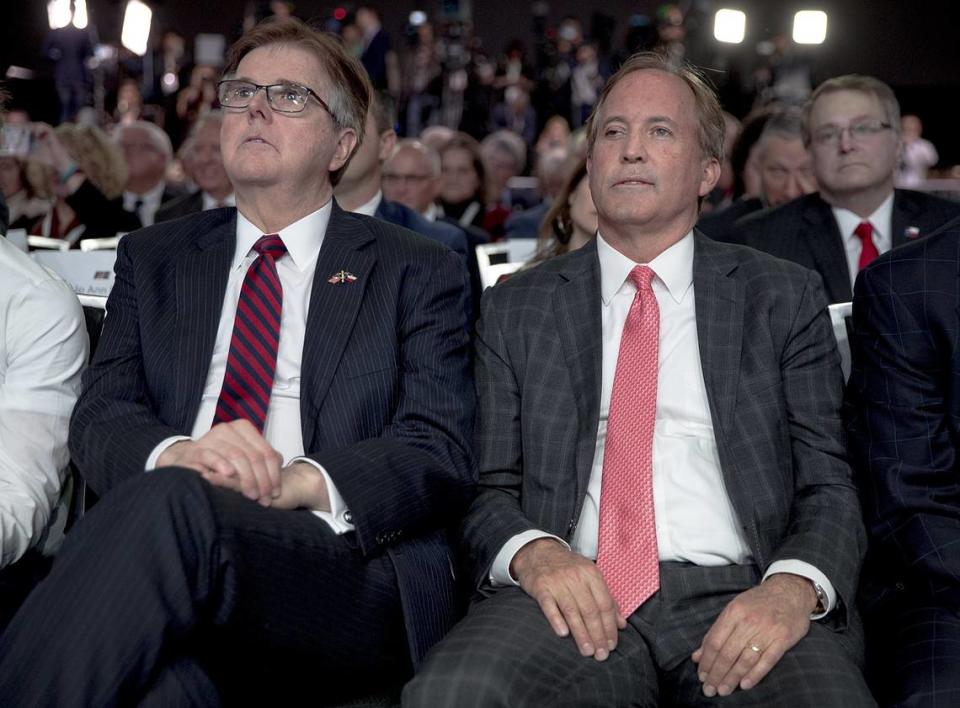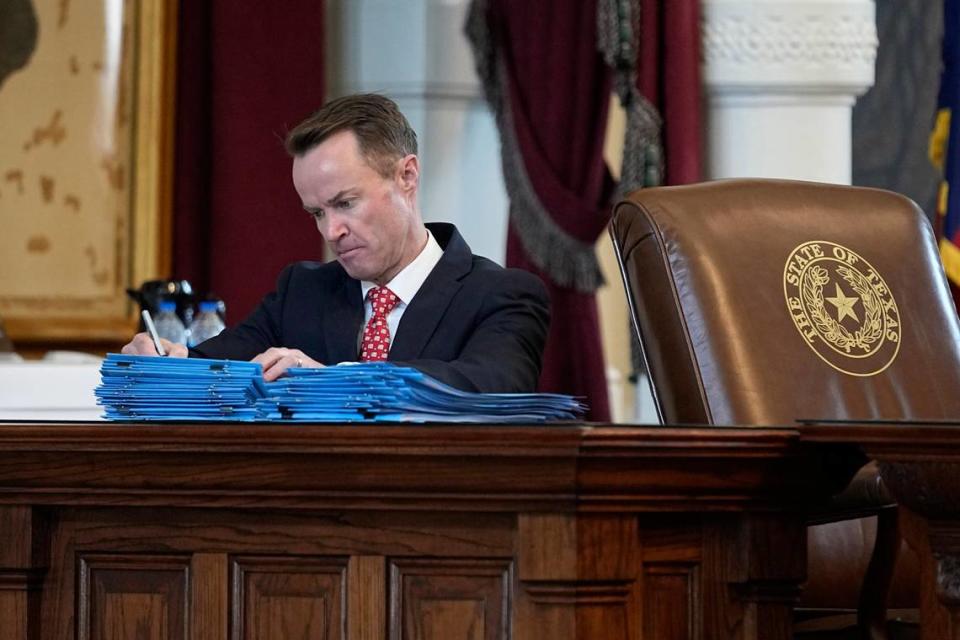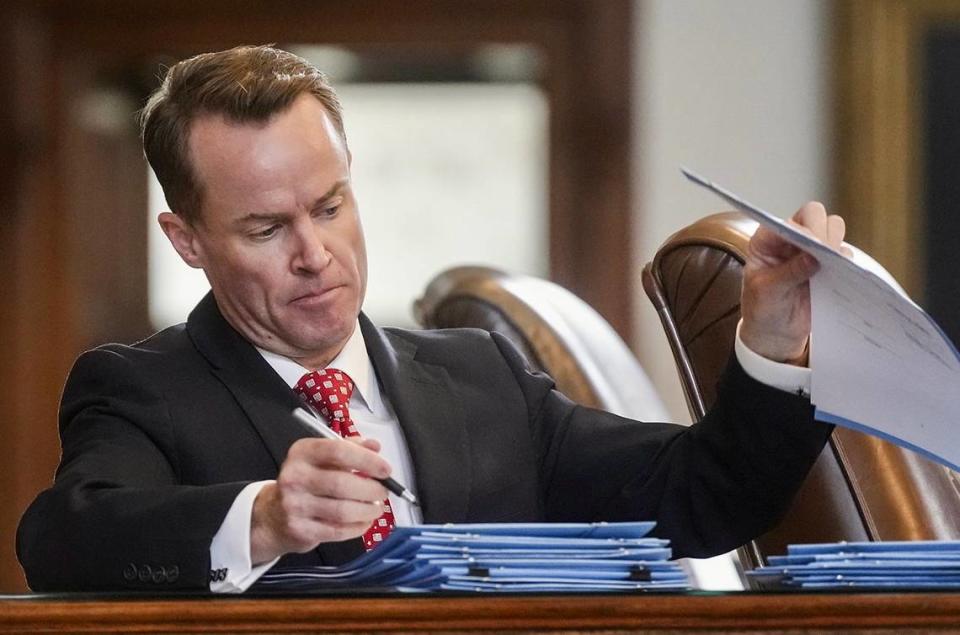‘Frosty to downright hostile’: Can Texas Republicans work together after impeachment?
The chasm between Lt. Gov. Dan Patrick and House Speaker Dade Phelan has at times resulted in name calling, snarky social media posts and stalled policies.
That was before Attorney General Ken Paxton’s impeachment trial in the Texas Senate.
The Republican lawmakers have represented different wings of the GOP as they’ve clashed on policy issues — namely education and property taxes. Paxton’s impeachment was just the latest wedge between the two Texas leaders and the legislative chambers they oversee.
Now, with the trial done and barbs traded on both sides, the two state leaders face a looming October special session in which they must work together on one of Gov. Greg Abbott’s top priorities — “school choice” in the from of a voucher-like program, a proposal that was already divisive before historic impeachment proceedings added fuel to the fire. Abbott hasn’t announced an exact start date for the session.
“I think that it will certainly deepen the gulf that had already existed between the more moderate Texas House and the more conservative Texas Senate,” SMU Political Science Professor Cal Jillson said of the impeachment trial.
Paxton, who’s in his third term, was reinstated as attorney general on Saturday after being cleared of more than a dozen articles of impeachment that the House sent to the Senate in late May. The House, including the majority of Republicans, voted 121-23 to impeach Paxton.
Minutes after the acquittal, Patrick delivered sharp rebuke of what he described as a reckless and wasteful rush to impeach Paxton. Some have criticized the House for not interviewing witnesses under oath or doing more to shore up evidence of impeachable offenses. Patrick has called for constitutional changes for impeachment rules and an audit the House proceedings’ costs to taxpayers.
“Millions of taxpayer dollars have been wasted on this impeachment,” said Patrick, who oversaw the proceedings as a judge of sort.
Phelan countered with a fiery response of his own, defending the House’s process and suggesting the trial’s outcome was “orchestrated from the start.”
“To be clear, Patrick attacked the House for standing up against corruption,” Phelan said in a Saturday statement.
If the heated exchange, delivered through public comments, is any indication, the relationship between the two and thus the tone of the Legislature will be tense come October.
From a cold war to a ‘hot war’
Texas Gov. Greg Abbott has made school choice a top priority and is expected to call lawmakers back to Austin in October.
During the regular session, Abbott toured the state advocating for a voucher-like plan called education savings accounts. Under the proposal, families could get public money to send their children to private school. While in Fort Worth visiting Nolan Catholic High School, he gave a version of the pitch he’d made at Christian school campuses across Texas: Parents have students trapped in public schools that don’t meet their needs because they can’t afford alternatives.
“We, as a state, have to help those families,” he said.
The proposal didn’t make it to Abbott’s desk during the regular legislative session that ended in late May, though it did pass in the Senate, a point Patrick was quick to make in a recent interview on “The Michael Berry Show” on KTRH-AM in Houston.
“This is up to Dade Phelan,” Patrick said. “He’s proven he can do anything he wants. He can get an impeachment in just a couple of days without giving any members any information or any evidence or any record. So if you can impeach a statewide official for the first time in 100 years, you ought to be able to pass school choice.”
The idea of vouchers has been opposed by rural Republicans in the Texas House, and lawmakers in the chamber made it clear midway through they wouldn’t support such a program. The matter was further complicated when the push for school choice was intertwined with teacher pay raises. Educator pay raises could come up again in the coming special session.
It’s just one example of the House and Senate butting heads — a phenomena not uncommon in the Texas Legislature.
The relationship between the chambers, particularly Phelan and Patrick, was also strained during debates over the best way to deliver property tax cuts.
“What was a kind of cold war has now become a very active hot war,” said Brandon Rottinghaus, a University of Houston political science professor. “I think Patrick’s diatribe against the impeachment process and targeting Phelan in particular definitely opened up a gaping wound in the relationship.”
Patrick and Phelan clash both on policy and personality, Rottinghaus said. He describes their relationship as ranging from “frosty to downright hostile.”
The chambers themselves are different bodies that allow the leaders to take different approaches to governing.
The Senate is smaller, made up of 31 members, and Patrick is their influential leader who can lead the chamber to more conservative policies. The House has 150 members and recently tends to be led by more moderate Republicans — Republicans who lean “a little bit more to the traditional business friendly conservatism of the Texas Republican Party” who are able to manage the “more populous, social conservative” members of the party, Jillson said.
“There are a number of differences,” Jillson said. “One of them is that Phelan has to manage the House whereas Patrick commands the Senate.”
It’s Patrick’s command of the Senate that can also create tension across the hall.
“Dan Patrick has never met a speaker that he liked,” said Rottinghaus. “I think Patrick wants to get his way and having to negotiate is, in his mind, one more hurdle that he shouldn’t have to go through.”
Governing despite the divide
Given the tension, how will anything get done when it comes time to govern in October?
That will be between the lieutenant governor and speaker, said Sen. Royce West, a Dallas Democrat whose district includes a small part of Tarrant County.
“You’ve gotta talk to them about that,” West said.
Phelan declined to comment through a spokesperson. Requests for comment sent to Patrick’s office were not returned.
“It will be an interesting challenge,” said Sen. Bob Hall, an Edgewood Republican, who joined most Republican senators in rejecting all of the articles of impeachment against Paxton.
Patrick told Austin television station KXAN that he isn’t concerned about tensions between Phelan and himself affecting the special session. In the interview, he urged the House and the governor to find an agreement on Abbott’s plan to let parents use public money for private education. The Senate won’t sign off on a “watered down version,” he said.
“Tensions between the speaker myself don’t matter,” Patrick told KXAN. “There were tensions between this speaker this session, and we passed the largest tax property tax cut in history, and many other really significant bills. Politics is tough.”
Sen. Phil King, a Weatherford Republican, is a freshman senator who represented part of North Texas in the House for more than two decades. He too voted to acquit Paxton on all of the articles. The evidence presented against Paxton was fragmented and circumstantial, he said. The facts House managers did prove didn’t rise to the level of impeachment, he added.
The impeachment proceedings have created some strain between the House and Senate, King said.
“How that plays out? I don’t know,” King said in an interview, looking ahead to the relationship between the House and Senate as they head into a special session. “I’m trusting in all the members to set everything aside and when we go back into special session to just try to be professionals, and we’ll all work through that. And as you know ... the House in the Senate often have some tension between them, just like Republicans and Democrats do.”
But the strain goes beyond chambers and into the Republican Party itself.
Throughout the trial, Paxton’s attorneys cast the impeachment proceedings as political, invoking Phelan and George P. Bush, one of Paxton’s primary opponents and a member of Texas’ Bush political dynasty. One of Paxton’s attorneys told senators that the “Bush era is over” during his closing arguments, noted Sen. Nathan Johnson, a Dallas Democrat.
“What the hell is that doing in here? And yet it creates these political fault lines,” Johnson told reporters. “I think it’s going to be difficult to get things done because the Republican Party itself doesn’t know where it wants to go on some of these things.”
Paxton too cast the impeachment as political in a roughly 45-minute interview with Tucker Carlson. In it, he blamed Phelan, House Democrats, President George W. Bush advisor Karl Rove and the Biden administration for the impeachment.
Rottinghaus expects the “anger and divide” within the GOP to spill over into the coming special session.
Phelan for one will have to navigate a revolt within his own party from some members of the far right who have lamented that Democrats have too much power in the chamber, Rottinghaus said.
Rep. Brian Harrison, a Midlothian Republican, called for Phelan to resign after the Senate acquitted Paxton. So did former President Donald Trump in a post on Truth Social. Hall told reporters on Saturday he wouldn’t comment on whether Phelan should be ousted as speaker, though he went on to criticize the House impeachment proceedings as a “sham investigation.”
And political consequences for Republicans in the House who brought the articles to the Senate?
“That’s up to the people,” Hall, the Edgewood Republican, said. “You know how everybody voted. You know what they did. The people need to decide. That’s one of the great things about our country. We have elections and elections where we can handle the consequences … of what’s done.”
Focusing on the immediate, Abbott made it clear something must happen on school choice come October, during a Tuesday tele-town hall.
“There’s an easy way to get it done, and there’s a hard way,” Abbott said, according to the Texas Tribune. “We will take it either way — in a special session or after an election.”





